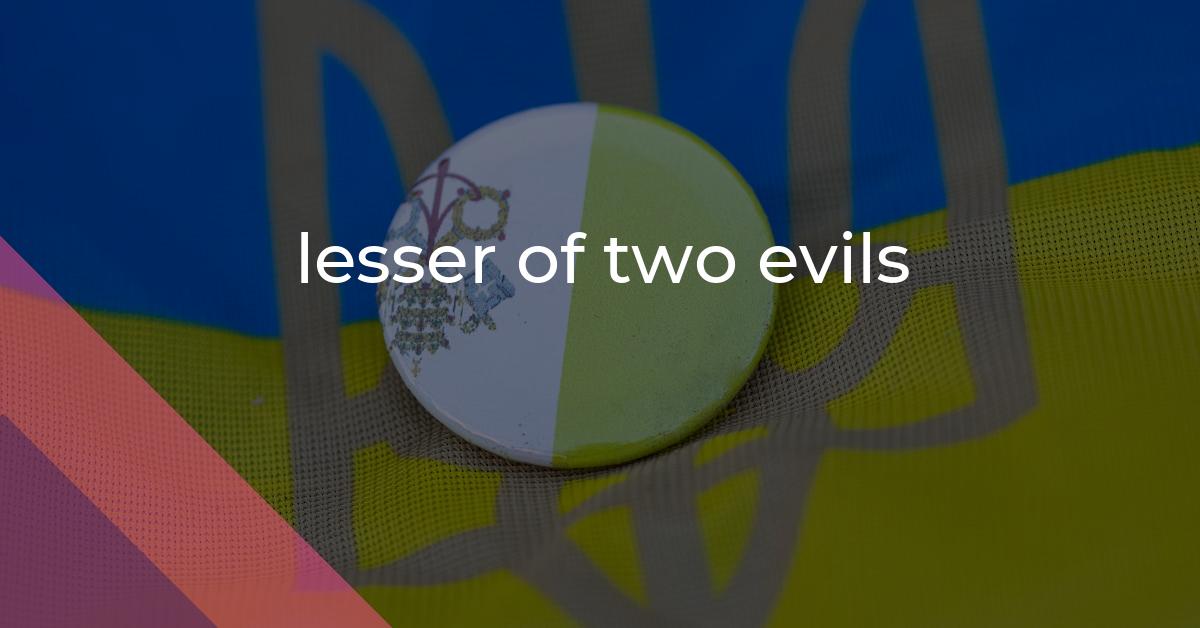lesser of two evils: Idiom Meaning and Origin
What does ‘lesser of two evils’ mean?
The idiom "lesser of two evils" means choosing between two unfavorable options while selecting the one that is considered less harmful or negative.

Idiom Explorer
The idiom "leave something to be desired" means that something is not as good as it should be or as one would expect it to be.
The idiom "in the least" is used to emphasize that something is not at all or in any way. It is often used to express a strong negative sentiment or to emphasize a lack of expectation or possibility.
The idiom "if it's all the same" is used to express indifference or lack of preference between different options or outcomes.
The idiom "happy medium" refers to finding a balance or compromise between two extremes or conflicting ideas.
The idiom "had better" is used to advise or warn someone about a particular action they should take in order to avoid a negative outcome. It implies a sense of urgency or necessity, often indicating that there may be negative consequences if the suggested action is not followed.
The idiom "get the better of" means to overcome or defeat someone or something in a competition, argument, or struggle.
The idiomatic phrase "get off lightly" means to escape punishment or a negative outcome with less severity or consequences than expected or deserved.
The idiom "fight shy of" means to avoid or be hesitant towards something due to fear, caution or reluctance.
The idiom "fall between two stools" means to fail or be unsuccessful because of indecision or inaction.
Embracing Compromises
The idiom "lesser of two evils" is a well-known phrase in the English language. It is commonly used to describe a situation where one must choose between two unfavorable options, but opts for the one that is perceived to be less harmful or undesirable.
The origin of this idiom can be traced back to ancient times, with similar sentiments expressed in various cultures throughout history. The idea that one must choose between two negative options has been a recurring theme in human decision-making for centuries.
While the exact source of the idiom is unclear, its usage can be found in literature and writings dating back several centuries. For example, in the 17th century play "The Spencers" by Richard Brome, the phrase "choosing the least of two evils" is used, showing its early existence.
Over time, the phrase has become ingrained in the English language and is commonly used in everyday conversations, politics, and other spheres. It reflects the reality that in some situations, it may be impossible to find an ideal or perfect solution, and one must make do with the available options.
The idiom "lesser of two evils" embodies a sense of pragmatism and a recognition of the limitations of choices. It acknowledges that sometimes, in order to avoid a greater negative consequence, one must opt for the option that is least detrimental, even if it is far from being ideal.
As with any idiom, the meaning of "lesser of two evils" can vary depending on the context in which it is used. However, at its core, it conveys the idea of making a choice between two undesirable options, and choosing the one that is perceived to be the lesser of the two.
The idiom can be applied to a wide range of scenarios, from personal dilemmas to complex societal and political issues. It reflects the reality that life often presents us with difficult choices, and sometimes the best we can hope for is to make the decision that will result in the least harm or negative consequences.
While the idiom may seem to suggest that there are only two options available, it is important to recognize that it is often used metaphorically to represent situations where there may be multiple choices, but none are ideal. It highlights the challenge of decision-making and the trade-offs that one must make.
The idiom "lesser of two evils" encompasses the struggle to find the "best of both worlds" - a situation where one can enjoy the advantages of two options without experiencing the drawbacks. However, in reality, this is often not possible, and one must choose the option that is less harmful or undesirable, even if it means sacrificing certain advantages.
When faced with a difficult decision, it is often said that one should go with their "best bet" - the option that they believe has the highest chance of success or the least potential for negative outcomes. In the context of the idiom "lesser of two evils," the best bet refers to the option that is perceived to be the lesser of the two unfavorable choices.
In some cases, it may be said that one "had better" choose the lesser of two evils - meaning that it is in their best interest to do so. This phrase implies a sense of urgency or necessity in making the decision, recognizing that delaying or avoiding the choice altogether may lead to even more detrimental consequences.
Ultimately, the idiom "lesser of two evils" embodies the concept of finding a "happy medium" - a compromise or balance between two extremes. It acknowledges that in certain situations, it may not be possible to find a perfect solution, and one must settle for an option that is less harmful or undesirable.
The idiom "lesser of two evils" encapsulates the universal experience of having to make difficult choices and selecting the option that is perceived to be less harmful or undesirable. Its longevity and widespread usage reflect its relevance and resonance in our language and culture. While it may not offer a perfect solution, it serves as a reminder of the complexities of decision-making and the compromises we sometimes have to make.
Example usage
Examples of how the idiom lesser of two evils can be used in a sentence:
- As much as I dislike going to the dentist, it is the lesser of two evils compared to dealing with a toothache.
- She couldn't decide which job offer to accept, but ultimately chose the lesser of two evils and went with the one that offered a higher salary.
- John didn't want to attend his cousin's wedding, but he realized it was the lesser of two evils when faced with the prospect of attending or disappointing his family.
More "Choice" idioms



